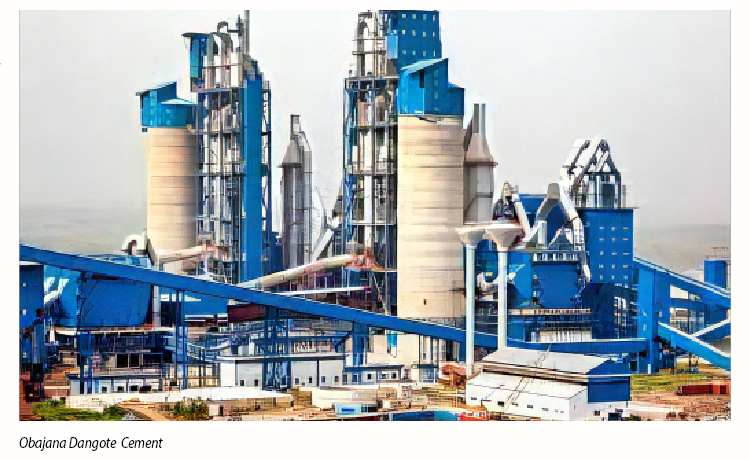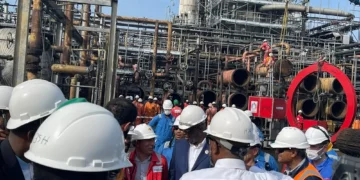Last week, the media space was awash with several reports of a tussle between the Dangote Cement Plant located in Obajana and Kogi state government with each side flexing their muscles.
While Kogi state government queried Dangote over the purported transfer of Obajana to Dangote Industries Limited as well as tax evasion, an allegation that Dangote, on the other hand, came out to deny.
In the process, Kogi state reportedly through its vigilante group, invaded the premises of Dangote cement, injuring several workers, in what experts said, was a reflection of poor handling of investment protection issues in the country.
They believe there are more decent ways to handle regulatory and legislative matters concerning businesses in Nigeria than resorting to alleged violence.
Taxation is accepted globally as the major means of funding governmental businesses to serve the people. Taxation is also used to grow the economy and at the same time, if wrongly applied, it has the effect of crippling economic activities.
Through its House of Assembly, Kogi State government ordered the sealing of Dangote Cement Plant Obajana over tax dispute. The plant was said to have been invaded by over 500 armed members of the state’s security outfit, the Vigilantes.
Meanwhile, the Kogi state government presented to the public, the report of the Specialised Technical Committee on the Evaluation of the Legality of the Alleged Acquisition of Obajana Cement Company Plc by Dangote Cement Company Limited.
The detailed report, submitted to governor Yahaya Bello and was presented to the public by the secretary to the state government, Folashade Ayoade revealed that the purported transfer of Obajana to Dangote Industries Limited, was invalid, null and void.
However, in a release signed by the group managing director of Dangote Cement Plc, Michel Puchercos, the firm said Obajana Cement plant in Kogi state is 100 per cent owned by the company.
On the other hand, the organised private sector has condemned the manner the state government took over the cement plant, using non-state actors. The private sector operators said the sealing of Dangote Cement Plant Obajana is retrogressive and discouraging to investors.
The Manufacturers Association of Nigeria (MAN) strongly condemned the invasion of the Plant by the Vigilantes noting that such action will discourage new investments in the state.
This is as the association urged the federal government to take urgent steps to amicably resolve the dispute between Dangote Cement Plc Plant, Obajana and the Kogi government over land ownership.
The president of MAN, Engr. Mansur Ahmed, said the action by Kogi State is of great concern, saying that it is unimaginable that a state government would take such drastic action to shut down a plant that provides job opportunities and economic activities on a huge scale for the people of Kogi State.
“The action appears to be taken by government and it is alleged to be an effort for some alleged claim on some alleged payment of taxes that have not been made or recovered from the company,” Ahmed said.
He added that the move was totally illegitimate, pointing out that if the state government had any issue against any member of its association or corporate citizen, the appropriate thing to do is to take the member to court.
“You cannot use strong-arm tactics to shut them down or impose very severe restrictions on their operations simply to force them. This is illegal and I believe that what has happened will not happen in a normal operating environment,” the MAN boss said.
He said the association has taken up the matter with the Federal Ministry of Industry, Trade and Investment in its bid to help address the anomaly in Kogi state.
“We have no reason not to pay taxes to the Kogi state government as and when due and I am aware that Dangote Industries is one of the highest tax-payers in Nigeria. But, if indeed for whatever reason that there is a tax for the Kogi State government on Dangote, it has measures and ways of recovery and there is no justification to threaten the closure of that industry.
“We are totally opposed to that kind of measure because there are ways to resolve this amicably in a legal manner and we hope that the relevant authorities in both the federal and state levels would intervene to ensure that this kind of action is not repeated,” he said.
Also, the director-general of Lagos Chamber of Commerce and Industry (LCCI), Dr. Chinyere Almona said the attack on the cement factory reflected the poor handling of investment protection issues in the country.
The Chamber said it believed there are more decent ways to handle regulatory and legislative matters concerning businesses in Nigeria than resorting to violence.
According to the Chamber, the invasion of the Dangote Cement Factory by youths that led to the shooting of factory workers is unfortunate, ill-construed, and avoidable.
The LCCI boss noted that the federal government and Kogi State government had hitherto benefited from business revenues and social investments, saying “it is therefore expected that the government would be interested in creating an enabling business environment that can attract both local and foreign investors.
“And where there are infractions, handling such should be in accordance with best practices and the rule of law that protect investors’ rights and human lives.”
LCCI called for a meeting of all government agencies connected with the acquisition of the cement plant to resolve any differences thereof.
The Chamber noted that the growing mining industry in Kogi State has benefited from the production activities of the Dangote Cement Factory, which offers both infrastructural and Corporate Social Responsibility (CSR) projects to enhance the standard of living in the state.
“We see a role for the Presidential Enabling Business Environment Council (PEBEC), the Bureau of Public Enterprises (BPE), the Nigeria Investment Protection Commission (NIPC), and the Kogi State government in resolving this issue. We, therefore, expect to see a swift intervention by these agencies toward a win-win resolution,” LCCI advised.
The director-general of National Association of Chambers of Commerce, Industries, Mines and Agriculture (NACCIMA), Olusola Obadimu said that the issues between the company and the state over tax dispute ought not to have led to sealing of the company but should have been resolved in a conciliatory and amicable atmosphere.
Obadimu said the state government should have trodden a path of caution, and called for the immediate reopening of the factory for normal production activities to resume.
He stated that NACCIMA’s position was based on some key considerations bordering on the impact of the factory’s closure on the economy and thousands of people whose means of livelihood depend on the production activities of the factory.
The NACCIMA boss urged that the factory be reopened as quickly as possible to enable it continue its operation and fulfil its necessary responsibilities, not just on tax obligations, but also keep the hundreds of thousands of Nigerians in its direct and indirect employment dutifully engaged; while sustaining its crucial services not just to the people and government of Kogi State but Nigeria in general.
Also, director-general of the Abuja Chamber of Commerce and Industry (ACCI), Ms. Victoria Akai urged the state government to employ dialogue in resolving whatever differences it has with the cement company so as to protect the image of the state as an investment destination.
She said both the state governor and the owner of Dangote Cement Plc, Alhaji Aliko Dangote are men of peace who should resolve any business dispute through consensus without jeopardizing the multi-billion naira investment and thousands of jobs of Kogi indigenes.
“We therefore call for the immediate re-opening of the factory and commencement of alternative dispute resolution. Dangote Cement is a company with commendable sustainability records. The company has blazed the trail within Nigeria and across Africa.
“Nothing should therefore be done to truncate the growing business at a time other African country are opening their doors wide for Dangote investment. The factory has been able to take many out of the street thereby reducing unemployment that has been a major problem in the country.
“The closure of the factory will further increase unemployment. It is in the best interest of Kogi state to reopen the factory so as not to scare away local and foreign investors,” ACCI noted.
Experts hope that Governor Yahaya Bello will listen to the voices of economic reasons, embrace dialogue as a means of settling tax disputes and improve the business environment in Kogi State to become more friendly for investors.











